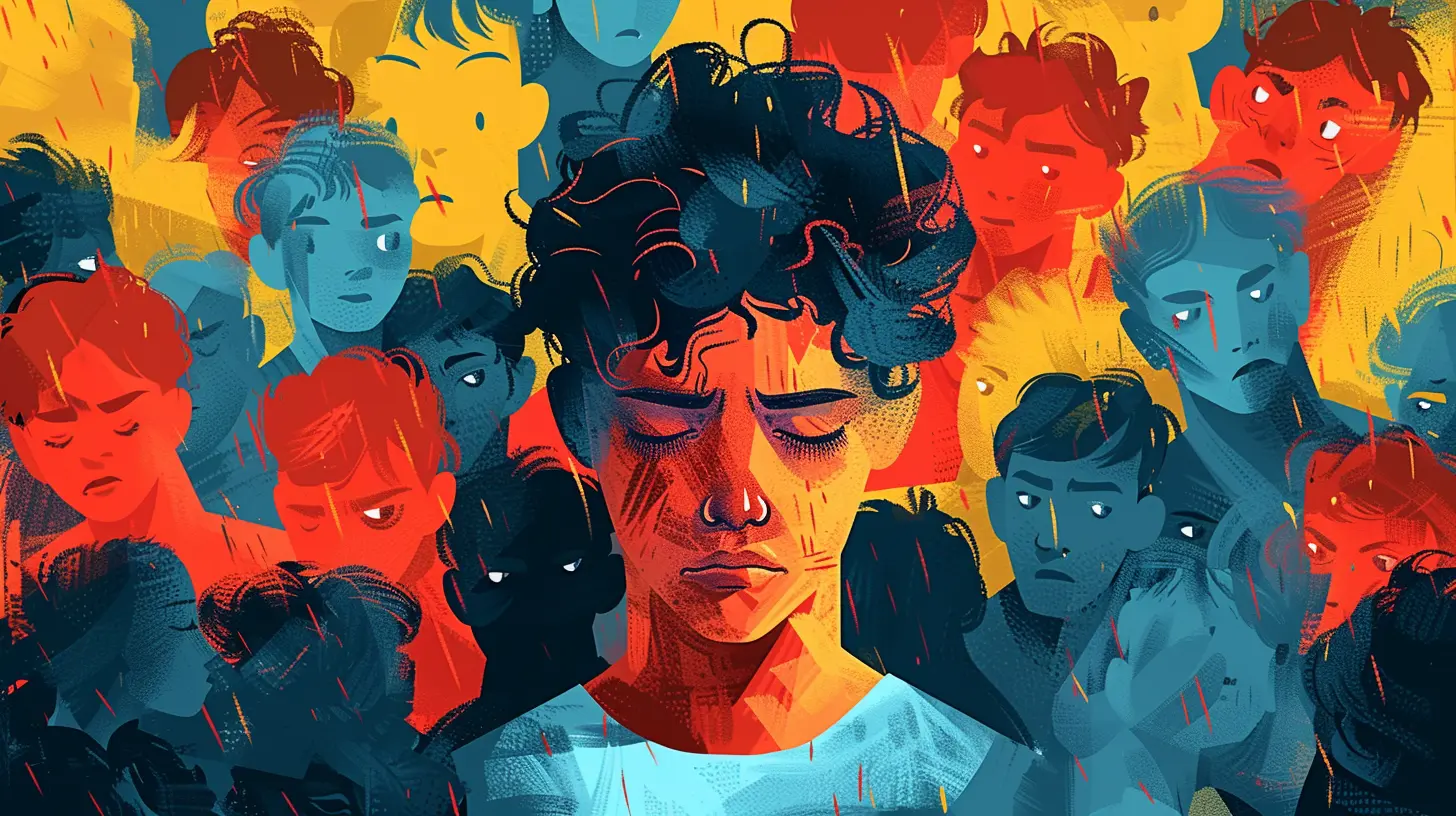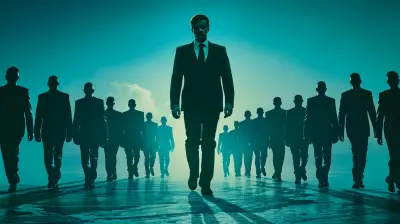How to Handle Rejection When You Have Social Anxiety
15 August 2025
Let’s be real—rejection sucks. No sugarcoating it. Whether it's being turned down for a job, ignored by someone you like, or being left out of plans, it stings. But when you’ve got social anxiety on top of that? It can feel downright paralyzing. That voice in your head doesn’t just whisper doubts—it screams them.
But here’s the thing: rejection is a part of life. And even though it hurts, it doesn’t have to crush you. In fact, it can even help you grow stronger—if you know how to deal with it the right way.
In this article, we’re gonna break down exactly how to handle rejection when social anxiety is tagging along like an annoying shadow. We’ll talk real talk—no fluff—and give you practical tools to deal with those heavy feelings, build confidence, and come out the other side braver and more resilient.
What Is Social Anxiety, Really?
Before we dive into the juicy stuff, let’s clear one thing up: social anxiety isn’t just “being shy.” It's more intense than that. It’s a fear of being judged, evaluated, or embarrassed in social situations. And that fear can be crippling.People with social anxiety often overthink every interaction. “Did I say the wrong thing?” “Do they think I'm weird?” “What if I look stupid?” Sound familiar?
So when rejection comes into play, it doesn’t just sting. It confirms every negative thought you've been trying to fight off. It's like pouring salt on a wound that never fully healed.
Why Rejection Hurts So Much When You Have Social Anxiety
Let’s break it down. When you get rejected, even for something small, your brain goes into overdrive:- ❌ “I knew they'd hate me.”
- ❌ “I can’t do anything right.”
- ❌ “This is why I don’t put myself out there.”
That inner critic becomes louder. But here’s the truth: rejection doesn’t mean you're not good enough. Often, it doesn’t even say much about you at all.
But social anxiety makes it personal. It makes it permanent. And that’s the problem.
Our brains are wired for connection. So when we get rejected, our primal instincts treat it as a serious threat—like social exile. For someone with social anxiety, that feeling gets amplified, like someone turned the volume up to 100.
Step One: Feel It, Don’t Fight It
Okay, first things first—let yourself feel the rejection.Yup. Don’t shove it down. Don’t pretend it doesn’t bother you. And definitely don’t say, “I’m fine” when you’re really not.
Give yourself permission to grieve, whether it's a missed opportunity, an unreturned text, or being turned down after a date. Rejection is loss, and loss hurts.
But here’s a little secret: emotions are like waves. They rise, peak, and then crash. If you let the wave carry you for a bit, it’ll pass faster than if you try to swim against it.
Ask yourself: “What am I really feeling right now?” Is it sadness? Embarrassment? Shame? Identify it. Then sit with it.
The more you suppress it, the longer it sticks around.
Step Two: Separate Fact from Fiction
Social anxiety loves to spin a good story.Let’s say you applied for a job and didn’t get it. If you have social anxiety, your brain might start telling you:
- “They thought I was stupid.”
- “I’ll never get hired anywhere.”
- “There’s something wrong with me.”
Pause. Is any of that actually true?
Here’s a practical trick: write down your thoughts, then challenge each one. Ask:
- What evidence do I have that this thought is true?
- Is there another way to look at this situation?
- What would I tell a friend if they went through the same thing?
You’re not a mind reader. You don’t know what the other person thought. Maybe the job went to someone with more experience. Maybe that person wasn’t ready for a relationship. Maybe it had nothing to do with you.
Rejection often says more about the other person’s needs, timing, or preferences than about your worth.
Step Three: Talk Back to Your Inner Critic
That voice in your head? The one that says you’re not good enough or that you're always going to be rejected? It’s a liar. Straight up.Social anxiety feeds on negative self-talk. So it’s time you start pushing back.
When that inner critic chimes in, talk to it like you’d talk to a rude stranger. You wouldn’t let someone walk up to you and say nasty things without standing up for yourself, right?
Try this:
- Inner voice: “You’re so awkward, no wonder they ghosted you.”
- You: “Being awkward doesn’t make me unlovable. Everyone is awkward sometimes.”
Changing your self-talk takes practice, but every time you challenge a toxic thought, you’re rewiring your brain. You’re teaching it that rejection isn’t a reflection of your worth.
Step Four: Take Tiny Risks, Again and Again
One of the worst side effects of rejection is avoidance.You got turned down once, so now you avoid new people. You didn’t get the job, so you stop applying. You were laughed at, so you never speak up again.
But the only way to lessen social anxiety is to take action.
Start small. Send a message. Compliment someone. Ask a question in a group chat. Tiny steps. Low stakes.
The more social situations you face—even if they don’t go perfectly—the more your brain learns: “Hey, this isn’t so bad.”
Remember: confidence isn’t built by avoiding what scares you. It’s built by doing what scares you and surviving it.
Step Five: Redefine What Rejection Means
Here’s a mindset shift that’ll change your life:Rejection isn’t a failure. It’s feedback.
It’s redirection.
It’s proof that you tried.
Why is that important? Because trying means you were brave enough to be vulnerable. That takes guts—and that’s something most people aren’t willing to do.
Think of rejection like a GPS rerouting you to a better path. Sure, the route changed, but you’re still moving forward.
Some of the most successful, interesting people you know? They’ve been rejected more times than you can count. The only difference is—they didn’t let it stop them.
Step Six: Boost Your Self-Worth from Within
Here’s the hard truth: if your self-worth depends on being accepted by others, rejection will always destroy you.The key is to build a core sense of worthiness that isn’t shaken by other people's opinions.
Ask yourself:
- What do I like about myself?
- What are my strengths?
- What makes me unique?
Not sure how to answer? Ask people who love you. Look at your past wins. Keep a “self-worth” journal. Write down every compliment or achievement—even the tiny ones.
The stronger your internal foundation, the less outside rejection can shake you. You stop making other people the judge of your value.
Step Seven: Know When to Ask for Help
If social anxiety and rejection are constantly overwhelming, you don’t have to go through it alone. Therapy can be a game changer.Cognitive Behavioral Therapy (CBT) is especially effective for social anxiety. It helps you identify distorted thoughts, develop healthier thinking patterns, and gradually face your fears.
You’re not broken. You’re not weak. Asking for help is one of the strongest things you can do.
Final Thought: Rejection Isn’t the End of Your Story
Look, I won’t pretend rejection ever feels good. That pain is real. But it doesn’t define you.Rejection is just a chapter in the book—not the whole story. And every time you face it, learn from it, and keep going? You grow.
You get braver.
You get stronger.
So the next time rejection shows up, look it in the eye and say: “You might slow me down, but you won’t stop me.”
Because you've got this.
Quick Tips Recap:
- Accept your feelings—don’t bottle them up.- Challenge your negative thoughts.
- Talk back to your inner critic.
- Start small and face social fears gradually.
- Redefine rejection as redirection.
- Build inner confidence and self-worth.
- Don’t be afraid to get professional support.
all images in this post were generated using AI tools
Category:
Social AnxietyAuthor:

Jenna Richardson
Discussion
rate this article
1 comments
Wolf McAleer
Rejection stings, but remember, even ice cream melts! Embrace the hiccups of social anxiety—each 'no' brings you closer to the next 'yes'!
August 31, 2025 at 4:36 AM

Jenna Richardson
Thank you for the uplifting reminder! Embracing each rejection as a stepping stone really helps in managing social anxiety. Every 'no' indeed brings us closer to a 'yes.


